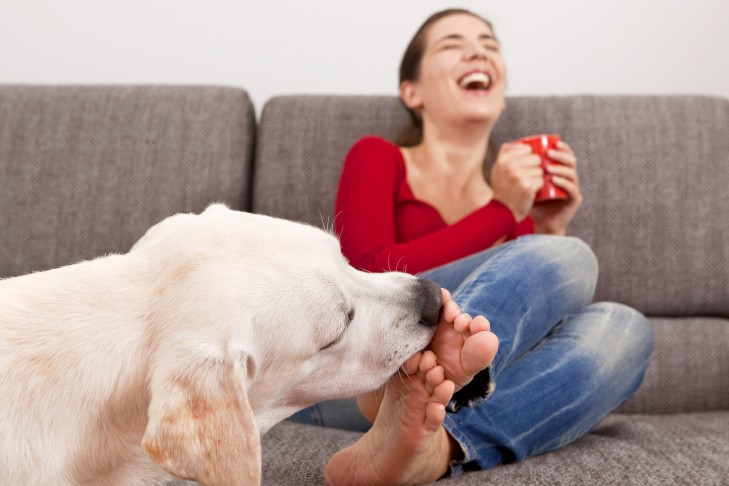It’s a common scenario for many dog owners: you settle down to relax, and suddenly, your furry friend is there, showering your feet with enthusiastic licks. While some might find this display of affection endearing, others may find it ticklish or simply perplexing. You might wonder, “Why Does My Dog Like My Feet so much?” Understanding this behavior requires a bit of insight into canine communication and sensory perception. Licking is a completely normal behavior for dogs, serving various purposes from communication to exploration. Let’s delve into the fascinating reasons behind your dog’s foot-licking fascination.
The Sensory World of Your Dog: More Than Just a Nose
Dogs possess an incredible sense of smell, far surpassing our own. But did you know they also have an extra sensory tool called the Jacobson’s organ, or vomeronasal organ? This specialized organ is located in the nasal cavity and connects to the roof of the mouth, allowing dogs to “taste” smells. When your dog licks your feet, they aren’t just experiencing the salty taste of your sweat; they are actively gathering a wealth of information. This organ enables them to detect pheromones and other chemical signals, providing a deeper understanding of their environment and the individuals within it. Think of your feet as a biological bulletin board, constantly broadcasting information about you that your dog is keenly interested in deciphering.
 Labrador Retriever dog lovingly licks the bare feet of a woman relaxing on a sofa, illustrating canine affection and sensory exploration.
Labrador Retriever dog lovingly licks the bare feet of a woman relaxing on a sofa, illustrating canine affection and sensory exploration.
Decoding the Lick: Reasons Behind the Behavior
So, what exactly is your dog trying to tell you, or learn about you, when they lick your feet? Here are several key reasons behind this common canine behavior:
-
Affection and Bonding: Licking is a natural display of affection for dogs. Just as mother dogs lick their puppies to groom them and show care, your dog may be licking your feet as a way to bond with you and express their love. This behavior is rooted in their pack animal instincts and strengthens the social connection between you and your dog.
-
Seeking Attention: Dogs are intelligent creatures and quickly learn what behaviors elicit a response from their owners. If your dog licks your feet and you react, even if it’s just to tell them to stop, they’ve received attention. If your reaction is laughter or playful interaction, they might perceive foot-licking as a fun game that guarantees your focus. This can quickly turn into an attention-seeking behavior if it’s consistently rewarded with your engagement.
-
Taste and Exploration: Let’s face it, feet, especially after a long day, can be salty and flavorful due to sweat. Sweat contains salts and other organic compounds that can be appealing to dogs. Combined with their Jacobson’s organ, licking your feet becomes a sensory exploration, allowing them to gather information about your scent, your health, and even your emotional state through the chemical signals present in your sweat.
-
Submission and Anxiety: In some cases, licking can be a sign of submission or anxiety. Dogs may lick as a way to appease a perceived authority figure or to self-soothe when feeling stressed or insecure. If your dog’s foot-licking is accompanied by other signs of anxiety, such as panting, pacing, or tucked tail, it’s important to consider the context and address potential stressors in their environment.
Curbing Excessive Foot Licking: Positive Approaches
While occasional foot licking is normal, excessive licking can become bothersome. It’s crucial to avoid punishing your dog for this natural behavior, as punishment can create fear and anxiety, potentially worsening the issue. Instead, focus on positive reinforcement techniques to redirect their attention.
-
Redirection and Distraction: When your dog starts licking your feet, redirect their attention to a toy or a chew. Offer them an alternative activity that is rewarding and engaging. This teaches them that there are more desirable ways to gain your attention.
-
Positive Reinforcement: Reward your dog with praise, treats, or petting when they stop licking your feet on command or when they engage in a different, desired behavior. Positive reinforcement strengthens the behaviors you want to encourage.
-
Establish Boundaries: If foot licking becomes persistent, gently remove your feet and calmly say “off” or “no lick.” Consistency is key. Make sure everyone in the household follows the same approach.
-
Consult Professionals: If the licking is excessive, compulsive, or accompanied by other behavioral issues, consider consulting with your veterinarian or a certified dog trainer. They can help identify any underlying anxiety or behavioral problems and develop a tailored training plan.
When Paw Licking Signals a Deeper Issue
It’s important to differentiate between foot licking and excessive paw licking. If your dog is constantly licking their paws, this could indicate an underlying medical issue. Possible causes include allergies (food or environmental), parasites, injuries, or skin irritations from contact with irritants like fertilizers. If you notice persistent paw licking, especially if accompanied by redness, swelling, or limping, a veterinary check-up is essential to rule out any medical problems and ensure your dog’s well-being.
In conclusion, your dog’s penchant for licking your feet is usually a normal behavior rooted in their sensory exploration, affection, and communication. By understanding the reasons behind this behavior and using positive training methods, you can manage foot licking while strengthening your bond with your canine companion. Remember to pay attention to any changes in licking behavior, especially excessive paw licking, as it could be a sign of an underlying health issue requiring veterinary attention.